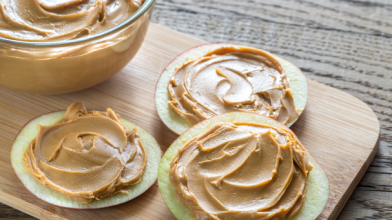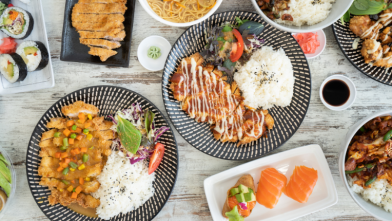Shopping at a grocery store can be overwhelming, and for some people it is a stressful event. Staying on a budget and making healthy choices can be tough at first, but with practice it can become a habit. Take the stress out of shopping and stay on budget with these helpful tips!
Make a Game Plan
Planning ahead can take some stress out of shopping and help you save money. Ask yourself these questions:
- What does my week ahead look like?
- Are there days where lunch is provided
- Do I have plans to dine out or parties to attend?
- Are there events around dinner time that will delay or cause me to eat on the road?
Do you have any recipes that use the same ingredients? Being able to use the same ingredients for a few recipes can be a great way to save money, and time, if you can prep them at one time. For example, make a Roasted Chicken and plan for leftovers. Use the leftovers and make a Roasted Chicken and Arugula Salad the next day. If you had more chicken left, you could make a Chicken, Pasta, and Spinach Soup the next day. Three meals from cooking chicken once!
Plan around your own eating schedule. Try not to buy food based on a hungry stomach! When hunger kicks in we get more cravings and it’s tempting to buy less healthy foods. Eat a healthy meal or snack before you shop if you are hungry.
Know Your Limits
To keep it simple, choose recipes that use only a small number of ingredients during the week. Aim to keep a short grocery list to take shopping—less items means less to buy and more money in your wallet. Keep your grocery list short and stick to it!
Shop the Perimeter
Shopping the perimeter means choosing items that are found around the edges of a grocery store. This is where you usually find fresh produce, eggs, dairy, meats, and poultry. Aim to fill your cart with these foods.
Have you noticed that most of these foods do not have a nutrition facts label? That’s because they are whole foods without added ingredients and have gone through little or no processing.
What is missing from the perimeter? The packaged goods that are often less healthy and highly processed, all found in the aisles and at the center of the stores. However, there are a few exceptions to this rule, such as canned or frozen legumes, fruits, and vegetables. Look for products with no added sugar or salt. If buying canned goods, rinse off the food and go for canned fruit that is in water only. Canned and frozen produce and legumes can provide just as many vitamins and minerals as fresh produce.
Know Which Label to Read
With so many new products and labels, it’s no wonder people are overwhelmed at the grocery store. Words like organic, fortified, wholesome, natural, and many more are used to attract customers. However, some of these words don’t have a clear definition and are not defined by the Food and Drug Administration. The FDA oversees food labeling to ensure you know what you are buying. Don’t pay more for words on labels making unproven or undefined claims.
One way to find out what you’re eating is to read the nutrition facts label and the ingredient list. Learning more about what is in your food and the nutrients you are getting can help you make better choices every day.
Buy in Bulk
If you have a big family, buying in bulk can help you save money. But beware! Buying food for the sake of a good sale can end up as waste. You may end up with extra food that you won’t eat and after some time it will spoil and need to be thrown out. If you want to buy in bulk, think about what foods you do eat regularly and think about how long they can be stored.
Some cheap and healthy items you may want to buy in bulk are foods that can become your pantry staples too, like canned or dried beans, canned vegetables, or dry products like whole grains such as quinoa, brown rice, or oats. Buying spices in bulk can save money, too. Re-use old spice containers and buy bulk spices in the right amounts to last up to a year or more. More spices mean more flavors in your food and less salt. Buying these items in bulk can give you a longer supply of food and save you money if planned right.














